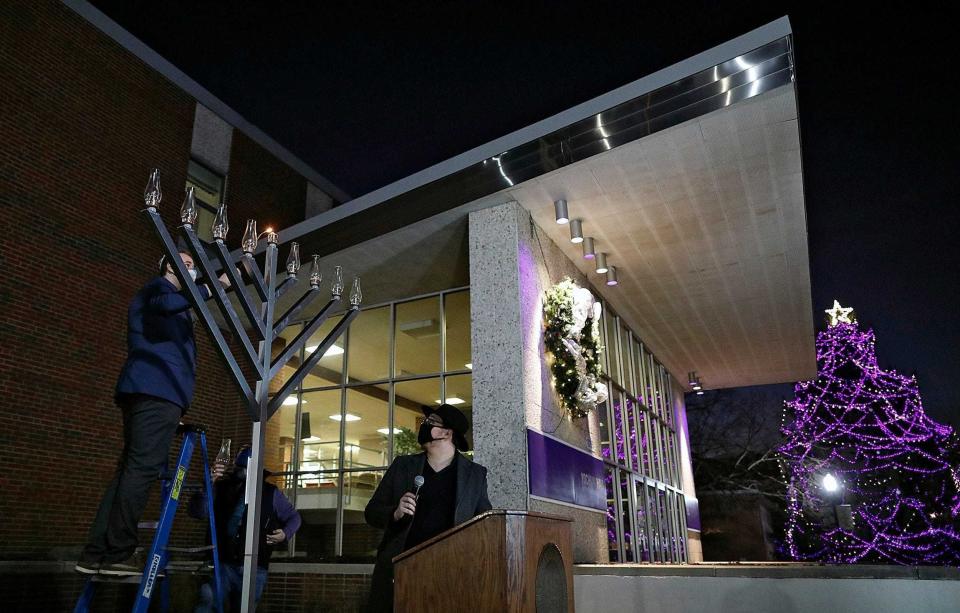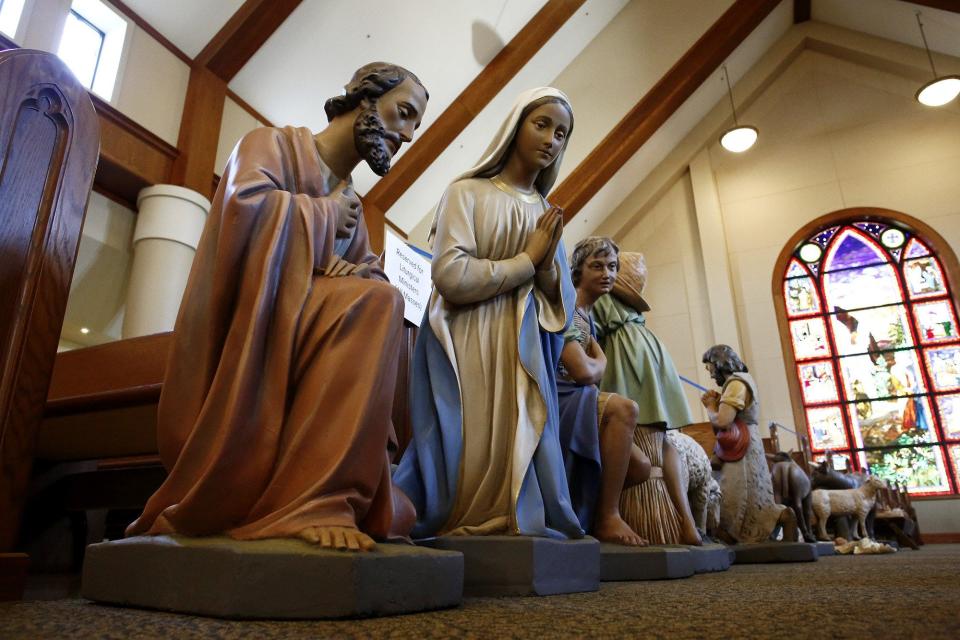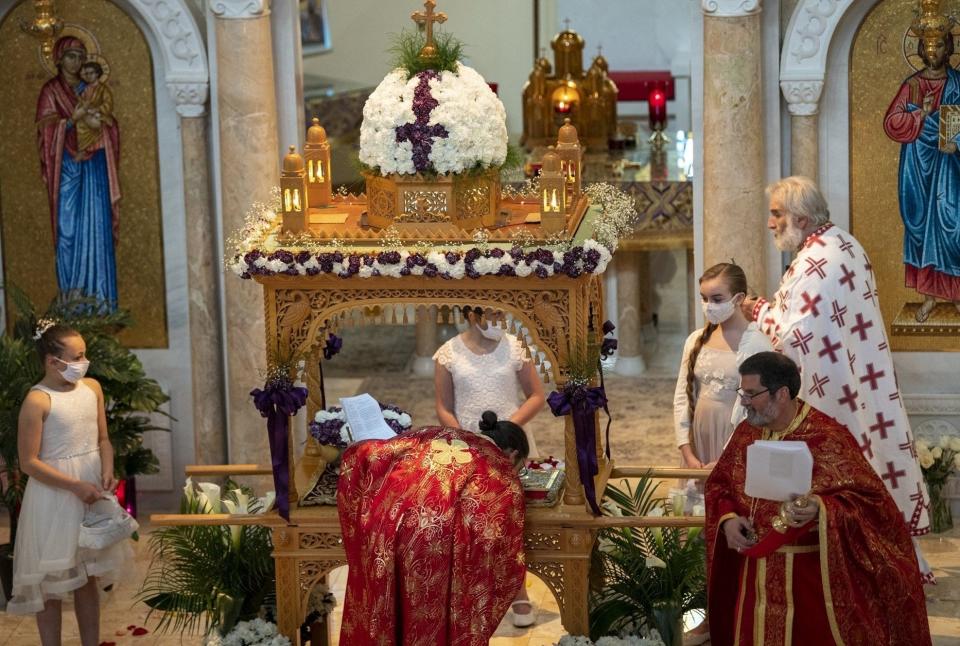Your guide to Passover, Easter and other major Jewish, Islamic and Christian holidays

- Oops!Something went wrong.Please try again later.
It is the season for the three major Abrahamic religions' holidays: Ramadan, Passover and Easter are upon us.
Ramadan, which began on the evening of March 22, is a holy month during which Muslims fast all day and break their fast at sundown. Often, the act of breaking the fast is celebrated in community with others and is called an iftar dinner.
Keeping the Faith: Approach of Jewish New Year offers opportunities for reflection, hope
In addition to fasting, the month is marked by charitable works, prayer and focus on God.
Passover, commemorating the end of enslaved Hebrew people, is also coming up and the seven-day period begins on the evening of April 5.
During the week, Jewish people don't eat leavened foods and celebrate with seder dinners, during which the story of Jewish people leaving Egypt is told through food and with a special book called a Haggadah.
Next, is the Christian celebration of Easter, on April 9.
Easter Sunday celebrates when Christians believe Jesus rose again from his grave and is commemorated with church services, baptisms and family meals. It marks the end of the introspective 40-day period of Lent.
If you see local people celebrating, you may wonder about Columbus's religious diversity. Although the majority of people in Ohio are Christian, there is plenty of religious diversity locally.
This guide is here to help with information about numerous holidays in Judaism, Islam and Christianity.
Islamic holidays
• Ramadan: Islamic holidays are determined by the moon, so the month of fasting that is Ramadan rotates, though in recent years it has been marked in the spring months. Muslims do not eat or drink during daylight hours during Ramadan and they practice self-sacrifice, work toward being morally good and focus only on God. The month commemorates when the first part of the Qur'an, Islam's holy book, was revealed by God.
Coronavirus in Ohio: Muslims focus on service, not gatherings this Ramadan
COVID-19: Columbus Muslims still working to connect with those of other faiths on Ramadan
'The culture of Ramadan': Iftar meals bring spirit of Ramadan to needy refugees
• Eid al-Fitr:After Ramadan, Muslims celebrate the end of fasting with three days of special prayers, sweets, gifts for children and community gatherings and festivals.
• Eid al-Adha: On the third day of Hajj — a pilgrimage to the holy land of Mecca in Saudi Arabia marked annually but which most Muslims only do once in a lifetime — Muslims mark Abraham's willingness to sacrifice his son. Celebrations include sacrificing a lamb, goat or cow and sharing the meat with friends, family and those in need. Hajj currently falls in the summer months.
'Longing for a community congregation': Annual Muslim celebration fills parking lot, not mosque this year
Jewish holidays
• Rosh Hashanah: The Jewish New Year involves eating apples dipped in honey, blowing a ram's horn and going to synagogue. It usually happens in the fall and is the beginning of the High Holy Days in Judaism.
COVID holiday: OU’s Hillel virtually connects students for Jewish High Holy Days
• Yom Kippur: The holiest and most solemn day of the year for Jews, known as the Day of Atonement, Jewish people mark the occasion by blowing the shofar, a ram's horn; fasting for 25 hours; and attending synagogue. It typically falls in September or October and is part of the High Holy Days in Judaism.
Blowing of the shofar: Holiday-ending horn blast called a 'catharsis' for Jewish people
• Sukkot: A seven-day harvest festival which falls a few days after Yom Kippur, Sukkot is also called the Feast or Festival of Tabernacles and is celebrated by building temporary dwellings outside.

• Hanukkah: Observers celebrate this eight-day festival by lighting a candle each night on a special candleholder called a menorah. The holiday falls in December and is also marked by a game of spinning tops called dreidels, potato pancakes called latkes and giving gifts. It tells the story of the victory of the Maccabees over the Syrian army and celebrates the miracle of a day's supply of oil keeping the menorah lit for eight days.
COVID celebration: Central Ohio synagogues celebrate Hanukkah with virtual, socially-distanced events
'Spark of hope': Hanukkah celebrations become larger, more elaborate in relation to Christmas
Latkes for Santa: Interfaith families balance Hanukkah, Christmas
• Purim: Usually falling in February or March, Purim is a lively celebration that commemorates the salvation of the Jewish people in ancient times when the genocidal plans of an official in the Persian empire were thwarted. The holiday is celebrated by giving monetary gifts to the poor; reading the book of Esther, which tells the Purim story; dressing in costume and sending gifts of food.
• Passover: Passover usually falls in the spring and marks the liberation of Hebrew enslaved people from Egypt. It lasts eight days, and Jews celebrate with seder dinners on the first two nights, during which they read from a special book called a Haggadah and tell the story of the Jewish people leaving Egypt. No bread or leavened food is eaten during the holiday.
Together again: Message of hope back in Passover, as some vaccinated plan to gather for Jewish holiday
'2 for Seder': To combat anti-Semitism, some central Ohio families invite non-Jews to Seder
Coronavirus and Passover: New Albany synagogue distributes Seder kits to help families stuck at home
Reinterpretation: Some Christians hold their own ‘Seder’ dinners
'They're not alone': Central Ohio Jews share Passover holiday with recent refugees
• Shavuot: This marks the day the Ten Commandments were given, and during its celebration, in summer, Jews eat meals with dairy in them.
Christian holidays
• Ash Wednesday: An introspective holiday that marks the beginning of the Lenten season and falls 40 days before Easter. The period of sacrifice, often observed by giving something up — such as sweets or alcohol — ends with the celebration of Easter, usually in April.
DIY: Churches find innovative ways to get ashes to members this Ash Wednesday
'Witness to good news': Church artists bring Lenten sermons to life by sketching as pastors preach
On Ash Wednesday, some Christians go to church for services, and their foreheads are marked with the sign of the cross in ashes collected after palms from the previous year's Palm Sunday service are burned. Some observant Christians do not eat meat on Ash Wednesday or Fridays during Lent.
Love, fasting and repentance: When Ash Wednesday falls on Valentine’s Day
• Easter: A Sunday, usually in April, that marks the resurrection of Jesus and is a period of celebration and renewal. Christians attend church and often have family meals as a celebration of Jesus rising again and the end of the Lenten period.
Self-care: Catholic church encourages sacrament of confession in Columbus before Easter
'Leap of faith': How Columbus-area churches are trying to provide hope, normalcy and community this Easter
Captivating: Downtown church uses butterflies to teach kids about Resurrection

• Christmas: Christmas falls on Dec. 25 and is a celebration of the birth of Jesus Christ, whom Christians believe to be the son of God. It is celebrated with church services, family gatherings, presents and meals.
Holiday giving: Hilliard woman repays precious gift she received as child
Different delivery: COVID-19 sparks creativity in Christmas services at central Ohio churches
'The least of these': COVID to alter Bethlehem on Broad, but event to serve those in dire need at Christmas
‘Go Tell It’: Grace Polaris Church unveils new Christmas pageant
'Highlight of the year': Away in a manger are live donkeys, llamas and camels
• Watch Night: On Dec. 31, African American Christians gather to pray in the New Year and mark the anniversary of the Emancipation Proclamation. Before the proclamation was issued in 1863, enslaved people gathered in churches to wait for word that President Abraham Lincoln had signed the document that would end their enslavement. Several African American churches in Columbus welcome congregants in to celebrate each year.
Keeping tradition alive: Churches hold New Year’s Eve vigils to pray for the new year

Orthodox Christian holidays
• Christmas: Orthodox Christians use a different calendar than other Christians — the Julian instead of the Gregorian — due to a split in the 11th century. Christmas usually falls in January for Orthodox Christians. The celebration is of Jesus' birth and baptism.
• Pascha (Easter): Orthodox Easter usually falls a few weeks after other Christians celebrate Jesus' resurrection and, though the event being celebrated is the same, Easter is a bigger holiday for the Orthodox community. Easter events are participatory and believers are included in recounting the events of Jesus' death, entombment and resurrection.
Participating in ancient events: Orthodox Easter services filled with hope though COVID precautions are still in place
dking@dispatch.com
@DanaeKing
This article originally appeared on The Columbus Dispatch: Christianity, Islam, Judaism: A guide to major religious holidays

